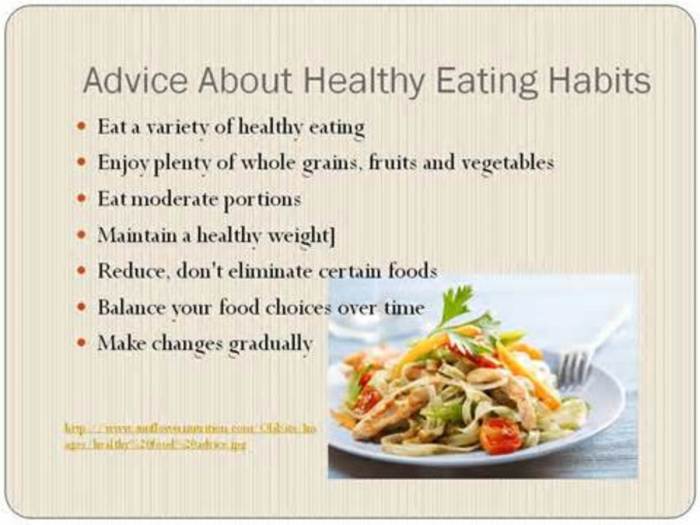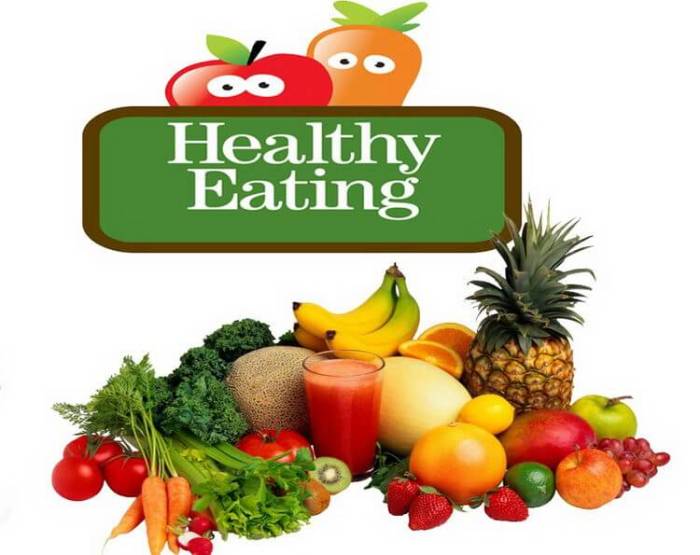Healthy Eating Habits take the spotlight in this guide, inviting you into a world of wellness where good choices lead to a vibrant life.
Discover the key components of a balanced diet, tips for developing healthier habits, and how to overcome common barriers along the way.
Importance of Healthy Eating Habits
Maintaining healthy eating habits is crucial for overall well-being and quality of life. By incorporating nutritious foods into daily meals, individuals can experience a wide range of benefits that positively impact their physical and mental health.
Impact of Healthy Eating on Overall Well-being
Eating a balanced diet rich in fruits, vegetables, whole grains, lean proteins, and healthy fats can significantly improve overall well-being. These nutrient-dense foods provide essential vitamins, minerals, and antioxidants that support various bodily functions and help prevent chronic diseases. By fueling the body with the right nutrients, individuals can boost their immune system, maintain a healthy weight, and reduce the risk of conditions like heart disease, diabetes, and cancer.
Benefits of Incorporating Nutritious Foods
- Increased energy levels: Nutrient-rich foods provide the necessary fuel for the body to function optimally, leading to higher energy levels throughout the day.
- Improved mood and mental health: Certain foods, such as those rich in omega-3 fatty acids, can help support brain health and reduce the risk of depression and anxiety.
- Enhanced digestion: A diet high in fiber from fruits, vegetables, and whole grains can promote healthy digestion and prevent issues like constipation.
- Stronger bones and muscles: Adequate intake of calcium, vitamin D, and protein can help maintain bone density and muscle strength, reducing the risk of osteoporosis and fractures.
- Better skin health: Nutrient-dense foods like fruits and vegetables contain antioxidants that protect the skin from damage and promote a youthful appearance.
Components of a Healthy Diet: Healthy Eating Habits
Eating a balanced diet is crucial for maintaining overall health and well-being. A balanced diet includes a variety of essential components to ensure the body receives the necessary nutrients for optimal functioning.
Essential Components of a Balanced Diet
- Proteins: Proteins are essential for building and repairing tissues, as well as supporting immune function. Sources of protein include lean meats, poultry, fish, dairy products, legumes, and nuts.
- Carbohydrates: Carbohydrates are the body’s main source of energy. It is important to choose complex carbohydrates such as whole grains, fruits, and vegetables, over simple carbohydrates like sugary snacks and beverages.
- Fats: Healthy fats are important for brain function, hormone production, and absorbing certain vitamins. Sources of healthy fats include avocados, nuts, seeds, and olive oil.
Importance of Including Fruits and Vegetables in Daily Meals
Fruits and vegetables are rich in essential vitamins, minerals, and antioxidants that are important for overall health. They also provide fiber, which aids in digestion and helps you feel full. Including a variety of fruits and vegetables in your daily meals can help reduce the risk of chronic diseases such as heart disease, diabetes, and certain cancers.
Role of Proteins, Carbohydrates, and Fats in a Healthy Diet
Proteins, carbohydrates, and fats are macronutrients that are essential for the body to function properly. Proteins help build and repair tissues, carbohydrates provide energy, and fats support cell growth and protect organs. It is important to consume these nutrients in the right proportions to maintain a healthy weight and promote overall well-being.
Tips for Developing Healthy Eating Habits

Developing healthy eating habits is all about making small changes that can lead to big results over time. Here are some strategies to help you make healthier choices when it comes to food:
Gradually Adopting Healthier Eating Habits
Start by incorporating more fruits and vegetables into your meals. Try adding a salad to your lunch or snacking on carrots and hummus instead of chips. Gradually reduce your intake of sugary drinks and processed foods, replacing them with water and whole foods. Set small, achievable goals for yourself each week to keep yourself on track.
Meal Planning and Preparation for Nutritious Meals
Plan your meals ahead of time to avoid last-minute unhealthy choices. Choose recipes that are balanced and include a variety of nutrients. When preparing meals, focus on cooking methods like baking, grilling, or steaming instead of frying. Batch cook on weekends to have healthy meals ready to go during the week.
Making Healthier Food Choices When Dining Out or Traveling
Look for restaurants that offer healthier options on their menu, such as salads, grilled proteins, or vegetable-based dishes. Ask for dressings and sauces on the side to control portions. When traveling, pack healthy snacks like nuts, seeds, or fruit to avoid relying on fast food or airport snacks. Stay hydrated by carrying a reusable water bottle with you at all times.
Common Barriers to Healthy Eating

Maintaining healthy eating habits can be challenging due to various barriers that individuals face in their daily lives. These obstacles can range from time constraints and budget limitations to managing cravings and staying motivated. It’s important to address these barriers in order to successfully adopt a healthy diet and lifestyle.
Time Constraints
One common barrier to healthy eating is the lack of time to prepare nutritious meals. Busy schedules and hectic lifestyles can make it difficult to prioritize cooking and meal planning. To overcome this barrier, individuals can try meal prepping on weekends or using time-saving kitchen appliances like slow cookers or instant pots.
Budget Limitations
Another obstacle to healthy eating is budget constraints. Fresh fruits, vegetables, and lean proteins can sometimes be more expensive than processed or fast food options. To work around this barrier, individuals can shop for seasonal produce, buy in bulk, and plan meals in advance to minimize food waste.
Managing Cravings, Healthy Eating Habits
Cravings for unhealthy foods can derail even the best intentions for healthy eating. To combat cravings, it’s important to keep nutritious snacks on hand, stay hydrated, and practice mindful eating. Finding healthier alternatives to satisfy cravings can also help individuals stay on track with their healthy eating goals.
Maintaining Motivation
Staying motivated to eat healthily can be a challenge, especially when faced with setbacks or temptations. Setting realistic goals, tracking progress, and seeking support from friends or family can help individuals stay motivated on their journey to better eating habits. It’s important to remember that healthy eating is a lifestyle change that requires consistency and perseverance.